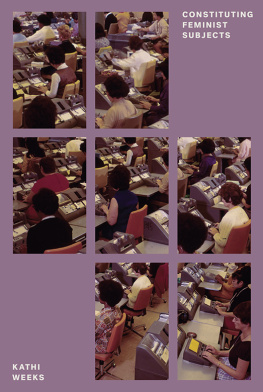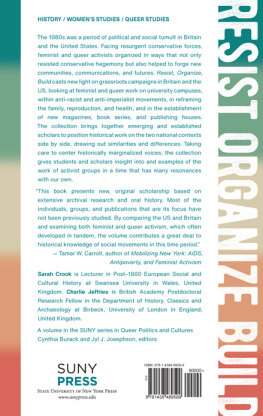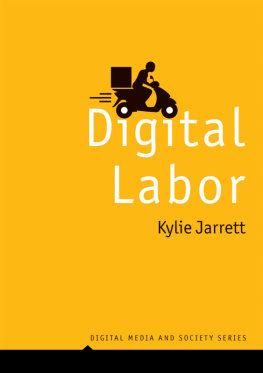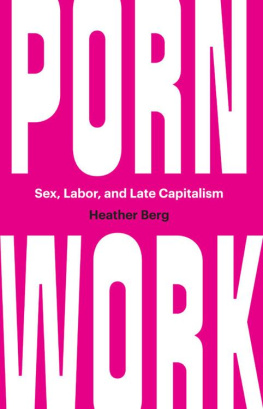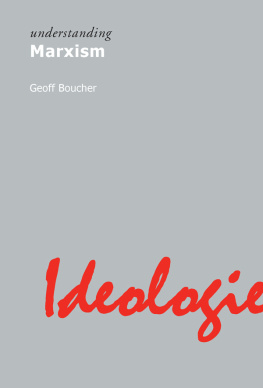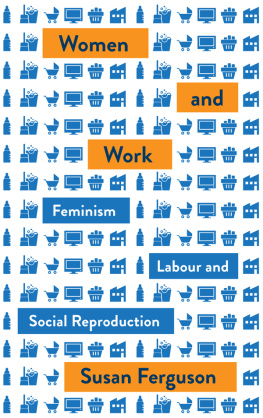I would like to thank the following friends and colleagues for their helpful feedback on versions of these arguments and portions of the manuscript: Anne Allison, Courtney Berger, Tina Campt, Christine DiStefano, Greg Grandin, Judith Grant, Michael Hardt, Stefano Harney, Rebecca Karl, Ranji Khanna, Corey Robin, Kathy Rudy, Karen Stuhldreher, and Robyn Wiegman. Thanks also go to Robert Adelman, Brittany Faulkner, Dennis Keenan, Marcie Patton, the Seattle FOJ, Julie Walwick, Cat Warren and David Auerbach, Diana Weeks, Lee Weeks, and Regan Weeks.
An earlier version of a portion of appeared as Hours for What We Will: Work, Family, and the Movement for Shorter Hours, in Feminist Studies 35, no. 1 (Spring 2009) and is reprinted here with the permission of the publisher.
INTRODUCTION The Problem with Work
Though women do not complain of the power of husbands, each complains of her own husband, or of the husbands of her friends. It is the same in all other cases of servitude, at least in the commencement of the emancipatory movement. The serfs did not at first complain of the power of their lords, but only of their tyranny.
JOHN STUART MILL, THE SUBJECTION OF WOMEN
One type of work, or one particular job, is contrasted with another type, experienced or imagined, within the present world of work; judgments are rarely made about the world of work as presently organized as against some other way of organizing it.
C. WRIGHT MILLS, WHITE COLLAR
Why do we work so long and so hard? The mystery here is not that we are required to work or that we are expected to devote so much time and energy to its pursuit, but rather that there is not more active resistance to this state of affairs. The problems with work todaymy focus will be on the United Stateshave to do with both its quantity and its quality and are not limited to the travails of any one group. Those problems include the low wages in most sectors of the economy; the unemployment, underemployment, and precarious employment suffered by many workers; and the overwork that often characterizes even the most privileged forms of employmentafter all, even the best job is a problem when it monopolizes so much of life. To be sure, if we were only resigned to such conditions, there would be no puzzle. What is perplexing is less the acceptance of the present reality that one must work to live than the willingness to live for work. By the same token, it is easy to appreciate why work is held in such high esteem, but considerably less obvious why it seems to be valued more than other pastimes and practices.
That these questions are rarely posed within the field of political theory is also surprising. The lack of interest in representing the daily grind of work routines in various forms of popular culture is perhaps understandable, And yet, to take a simple example, the amount of time alone that the average citizen is expected to devote to workparticularly when we include the time spent training, searching, and preparing for work, not to mention recovering from itwould suggest that the experience warrants more consideration. Work is crucial not only to those whose lives are centered around it, but also, in a society that expects people to work for wages, to those who are expelled or excluded from work and marginalized in relation to it. Perhaps more significantly, places of employment and spaces of work would seem to be supremely relevant to the very bread and butter of political science: as sites of decision making, they are structured by relations of power and authority; as hierarchical organizations, they raise issues of consent and obedience; as spaces of exclusion, they pose questions about membership and obligation. Although impersonal forces may compel us into work, once we enter the workplace we inevitably find ourselves enmeshed in the direct and personal relations of rulers and ruled. Indeed, the work site is where we often experience the most immediate, unambiguous, and tangible relations of power that most of us will encounter on a daily basis. As a fully political rather than a simply economic phenomenon, work would thus seem to be an especially rich object of inquiry.
There are at least two reasons for the inattention to work within political theory that bear mentioning. The first of these is what I will call the privatization of work. As the pair of epigraphs above suggest, we seem to have a hard time grasping the power relations of both work and family systematically; we often experience and imagine the employment relationlike the marriage relationnot as a social institution but as a unique relationship. Certainly this can be explained in part by the institution of private property that secures the privacy of the employment relation alongside the marriage relation. However, it should also be noted that this mode of privatizing work is not easily maintained: work has long occupied a somewhat vexed position in the private-public economy of liberalism. Thus, even though John Locke could establish the private character of work through both the natural right to property and its integration into the economy of the household, the states role in defending property rights (and, since Lockes day, increasingly regulating and planning on propertys behalf) threatens the status of work as a private relationship, exposing it, by the logic of Lockes scheme, to the purview of properly political power. Works place within the private-public division becomes even more troubled with the advent of industrialization; as work becomes identified with waged work and separated from the household, it could more easily seemby comparison to that exemplary private sphererelatively public. But there are additional mechanisms that secure what I am calling works privatization. One is its reification: the fact that at present one must work to earn a living is taken as part of the natural order rather than as a social convention. Consequently, as C. Wright Mills observes (in one of the epigraphs above), we tend to focus more on the problems with this or that job, or on their absence, than on work as a requirement, work as a system, work as a way of life. Like the serfs who, as John Stuart Mill claims in the other epigraph, did not at first complain of the power of their lords, but only of their tyranny (1988, 84), we are better at attending to the problems with this or that boss than to the system that grants them such power. The effective privatization of work is also a function of the way the labor market individualizes worknever more so than today, with the enormous variety of tasks and schedules that characterize the contemporary employment relation. The workplace, like the household, is typically figured as a private space, the product of a series of individual contracts rather than a social structure, the province of human need and sphere of individual choice rather than a site for the exercise of political power. And because of this tethering of work to the figure of the individual, it is difficult to mount a critique of work that is not received as something wholly different: a criticism of workers. As a result of works subordination to property rights, its reification, and its individualization, thinking about work as a social systemeven with its arguably more tenuous private statusstrangely becomes as difficult as it is for many to conceive marriage and the family in structural terms.


